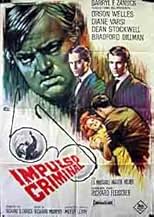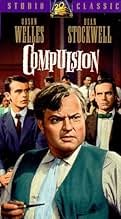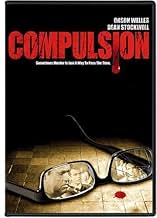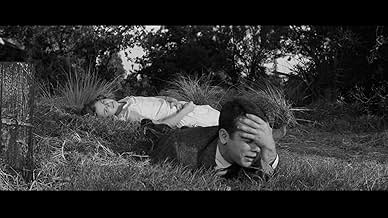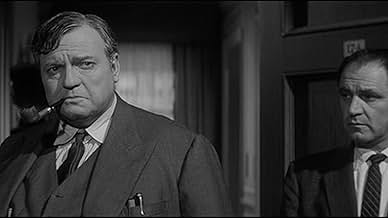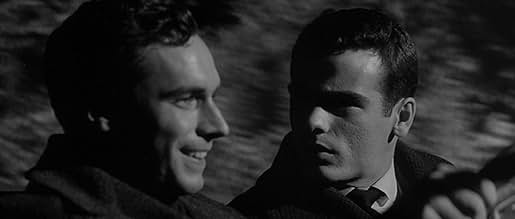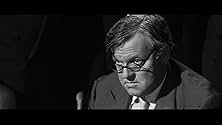IMDb RATING
7.4/10
7.9K
YOUR RATING
Two wealthy law-school students go on trial for murder in this version of the Leopold-Loeb case.Two wealthy law-school students go on trial for murder in this version of the Leopold-Loeb case.Two wealthy law-school students go on trial for murder in this version of the Leopold-Loeb case.
- Nominated for 1 BAFTA Award
- 1 win & 5 nominations total
Robert F. Simon
- Police Lt. Johnson
- (as Robert Simon)
John Alban
- Reporter
- (uncredited)
Don Anderson
- Reporter
- (uncredited)
Brandon Beach
- Courtroom Spectator
- (uncredited)
Terry Becker
- Benson - The Angry Reporter
- (uncredited)
Russ Bender
- Edgar Llewellyn - Attorney
- (uncredited)
- Director
- Writers
- All cast & crew
- Production, box office & more at IMDbPro
Storyline
Did you know
- TriviaAlthough the story was a thinly-disguised recreation of the Nathan Leopold and Richard Loeb murder case, the legal department of 20th Century Fox was still concerned about a possible lawsuit from the still-living Leopold. A great effort was made not to mention Leopold or Loeb in the movie, press releases, and interviews. However, there was apparently poor communication with the advertising department, since when the movie came out, newspaper ads stated, "based on the famous Leopold and Loeb murder case." Leopold sued the filmmakers. He did not claim libel, slander, nor anything false nor defamatory about the film. Instead, he claimed an invasion of privacy. The court rejected his claim, in part, because Leopold had already published his own autobiography "Life Plus 99 Years," presenting essentially the same facts.
- GoofsWhen the murdered boy is in the morgue, his uncle recognizes him instantly, and the coroner doesn't mention to the young journalist (who found the glasses) that the kid had acid burned all over his face so he couldn't be identified. In the real life case, his face was burned and, most importantly, at the very end of the movie, Orson Welles as the defending attorney mentions that the murdered boy's face was burned with acid.
- Quotes
Jonathan Wilk: If there is any way of destroying hatred and all that goes with it, it's not through evil and hatred and cruelty, but through charity, love, understanding.
- Crazy creditsOpening credits prologue: CHICAGO, 1924
- ConnectionsFeatured in The Paper Chase: Commitments (1983)
Featured review
Compulsion is directed by Richard Fleischer and adapted to screenplay by Richard Murphy from the novel written by Meyer Levin. It stars Dean Stockwell, Bradford Dillman, Orson Welles and Diane Varsi. Music is by Lionel Newman and cinematography by William C. Mellor.
Based upon the real life Leopold and Loeb murder trial of the 1920s, Compulsion finds Artie Strauss (Dillman) and Judd Steiner (Stockwell) as two well to do young men attempting to commit the perfect crime - murder! But it wasn't so perfect after all and they soon find themselves on trial for their own lives. Enter famed attorney Jonathan Wilk (Welles), who fights to keep them from the death penalty.
Healthily rated in some quarters, it's a film that actually does divide opinions, which when all is considered is unsurprising given the capital punishment core of the story. The story builds superbly, brilliantly photographed and paced by cinematographer and director, and performed with imposing skills by Dillman and Stockwell. Then the crux of the film arrives in the form of Welles, who late in the play has the unenviable job of turning the piece into a soapbox anti capital punishment advertisement.
It's also a performance from Welles that has drawn major pros and cons in critical circles. Whatever your thoughts on capital punishment, Welles makes a telling acting mark. The sound mix could have been fine tuned, as Welles is prone to mumble during his speeches, but it remains gripping on court room drama terms, even if there's a little deflation - a feeling of anti-climax - after the build up had been so good. Not really capturing the notoriety of the real case, it's nonetheless a compelling piece and well worth seeking out. 7/10
Based upon the real life Leopold and Loeb murder trial of the 1920s, Compulsion finds Artie Strauss (Dillman) and Judd Steiner (Stockwell) as two well to do young men attempting to commit the perfect crime - murder! But it wasn't so perfect after all and they soon find themselves on trial for their own lives. Enter famed attorney Jonathan Wilk (Welles), who fights to keep them from the death penalty.
Healthily rated in some quarters, it's a film that actually does divide opinions, which when all is considered is unsurprising given the capital punishment core of the story. The story builds superbly, brilliantly photographed and paced by cinematographer and director, and performed with imposing skills by Dillman and Stockwell. Then the crux of the film arrives in the form of Welles, who late in the play has the unenviable job of turning the piece into a soapbox anti capital punishment advertisement.
It's also a performance from Welles that has drawn major pros and cons in critical circles. Whatever your thoughts on capital punishment, Welles makes a telling acting mark. The sound mix could have been fine tuned, as Welles is prone to mumble during his speeches, but it remains gripping on court room drama terms, even if there's a little deflation - a feeling of anti-climax - after the build up had been so good. Not really capturing the notoriety of the real case, it's nonetheless a compelling piece and well worth seeking out. 7/10
- hitchcockthelegend
- Aug 9, 2015
- Permalink
Details
- Runtime1 hour 43 minutes
- Color
- Aspect ratio
- 2.35 : 1
Contribute to this page
Suggest an edit or add missing content



